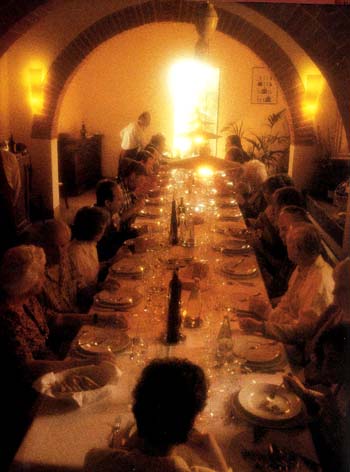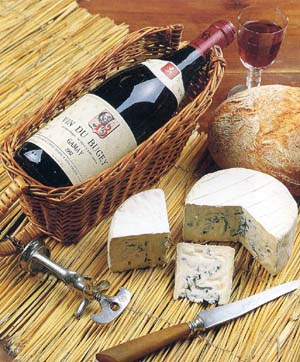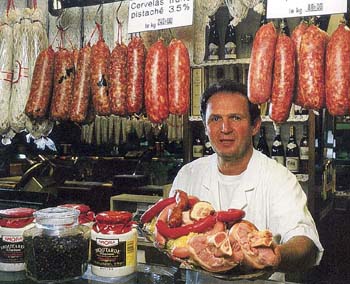 |
Manners, Customs, Clothing
Fast Food Is Protestant
Marian T. Horvat, Ph.D.
When I was young, I used to think I was quite deprived. We simply did not ever go to fast food restaurants. My father refused – stubbornly and steadfastly, we thought then – to eat what he considered was not “real food.” We ate together as a family, and we ate a home-cooked meal preceded by a salad or soup. Period.
Now, an Italian theologian has sparked controversy with theories remarkably similar to my father’s. With a new invasion of Europe by McDonalds and fast food eateries, Massimo Salani, professor of the Interdiocesan Center of Theology of Pisa, has responded with a harsh judgment on the fast food revolution in his book At the Table with the Religions.

An inviting ambience in an Italian cantina propiates warm conversation and convivium |
“The style of fast-food completely ignores the sacred dimension of meals,” Salani told the Italian Catholic daily Avvenire on the occasion of his book launching this January. “At McDonalds you satisfy your hunger in a rushed way so that you can move on to do other things,” he lamented. Adding fuel to the fire, he insisted: “It lacks the communitarian or sharing aspect of a meal. Fast food is not Catholic. It is Protestant.”
I am glad a Catholic theologian finally said it. God forbid had some traditionalist dared to label fast food as “Protestant, even atheist,” as Prof. Salani did. His reasoning is not difficult to understand, since the man who eats by himself normally does not pay any attention to others. This would be analogous to the Protestant “free examination” where each one “assimilates the spiritual food” by himself unassisted by others. Fast food, he reasoned, would be the antithesis of receiving Communion, where we receive the Body of Our Lord, and should be spurned by Catholics. In fact, the fast-food mentality of eating quickly and alone would be better suited to the “Lutheran mentality of an individual relationship between man and God.”
Naturally, such bold accusations raised the ire of fast food establishments like McDonalds, who went so far as to issue a statement defending the compatibility of its products with the world faiths. The non-ecumenical tonus of the judgment also provoked responses from Rome’s Lutheran pastor who rallied to the defense of the heresiarch. Even the papal theologian entered the discussion. Although Fr. Georges Cottier, O.P. would not go so far as to call hamburgers Protestant or even non-Christian, he nonetheless admitted that “our civilization needs to reflect on this more. So does the Church. In the Christian vision there is a deeper meaning to meals, which we find in the Bible, where it speaks of special feasts and fasting periods, for example.”
We can not lose sight of one aspect of Cottier’s statement. With his attacks on the fast food chains, he is following the same line as the habitual attacks the present-day Vatican makes against Capitalism, since McDonalds are in many ways representative of it. Let me say that I emphatically disagree with this orientation of the Vatican. Nonetheless, in the important matter of a Catholic way of dining, I think he makes a very good point. A bit of reflection on the topic leads to more than one conclusion regarding the deleterious effects of the fast food revolution on Christian Civilization.

"And to Catholic men that drink upon wine,
Are deep in water and frank and fine.
Wherever I travel, I find it so,
Benedicamus Domino!"
- from The Path to Rome, Hillaire Belloc |
How many families or individuals who order out for fast food only to devour its contents before the television? This is the death sentence to convivium, conversation, good manners and family life. The communal family meal is truly supposed to be an exercise in courtesy. It would be unimaginable that all should not share the prepared meal. No special orders to suit the whim of the moment: “I’ll have the cheeseburger and fries, no, make that onion rings.” “I think I’ll have Chinese food instead.” I know homes where families can order out at three different places in order to satisfy everyone’s particular tastes for the evening. Each one is permitted to choose his meal from the assorted items, just like everyone chooses his own interpretation of the Bible in the Protestant denominations. It all depends on personal taste.
Fast food meals are also producing a generation of young people who simply do not know how to eat well or understand the role of meals in a Christian culture. The fast food style of feeding nourishes tendencies that are fostering a downright tribal lifestyle. Table settings are eliminated. China and water glasses – much less the proper wine glasses – are replaced by throwaway wrappers and paper cups. Adults and children eat with their hands, not silverware. There is no leisurely savoring of the flavors of courses served with the appropriate wine, a Chablis with freshwater fish, a rich Burgundy with the meat, a sweet Sauterne accompanying dessert. It has reached the point where people eat anything, at any hour, in any way, next to – not together with – anyone. There is more ceremony among the nomadic desert Bedouins than among a family eating a typical fast food meal.
There is another more banal, but still weighty, consequence of the fast food revolution. Statistics show we are becoming a nation of fat people. It is not just the adults who are putting on pounds. Even our children are overweight. A recent study from the Center for Disease Control reported that 13% of children ages 6 to 11 are overweight, up from 4% in the ‘60s. A good share of the blame was laid on junk food snacks and fast food meals.

The organic food of France displays a richness that reflects the people's healthy psychology and traditions. The owner of this charcuterie in Lyons proudly displays a varied array of sausages and hams |
One of the first thing that strikes an American tourist in Paris is how the French can eat so much (four and five course meals), drink wine every day, and yet stay so thin. The answer is simple. Their diet and habits are healthful. They eat three meals a day. They don’t snack. They eat incredibly fresh food, especially the fruit and vegetables. The typical meal is enjoyed with leisure – a remnant of the customs of the Christian Civilization that made it great. Fast food is simply not what meals should be about. However, I am not so sure we can simply shift full blame of the fast food revolution and its consequences on the Protestants. It seems to me the burden of guilt can be spread more thinly, as Catholics blithely adopt the fast-food solution for reasons of time and convenience – or simply to please picky eaters whose appreciation for food no longer extends beyond burritos, fries, and pizza.
One thing for sure. Prof. Salani’s new work certainly vindicates the position of my father, who was, it seems, not so unreasonable or old fashioned after all. He was just being Catholic in his unwavering refusal to participate in the fast food revolution.

Posted Januar 17, 2003

Related Works of Interest
|
|
Manners | Cultural | Home | Books | CDs | Search | Contact Us | Donate

© 2002- Tradition in Action, Inc. All Rights Reserved
|
 |
|